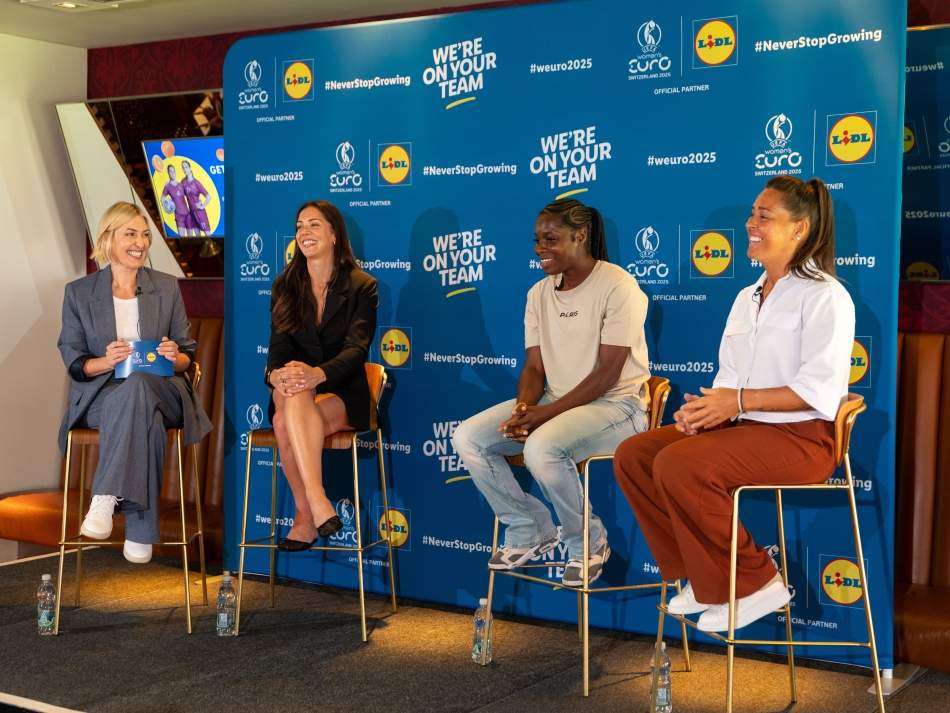June 26 – As the UEFA Women’s EURO 2025 approaches, newly released research from Lidl GB has exposed a glaring blind spot in women’s sports: nutrition.
The data reveals a significant nutrition shortfall at both elite and grassroots levels of women’s football.
Lidl GB used its role as the Fresh Fruit & Vegetable Partner for Women’s EURO 2025 to host a discussion at London’s Emirates Stadium on Wednesday, which helped to expose the issue of nutrition in women’s sport.
Former England midfielder Fara Williams was joined by presenter Kelly Cates, nutritionist Dr. Hazel Wallace and social media influencer and player Freda Ayisi on the panel, which mulled over how to solve the issue of failing nutrition in women’s football.
The puzzle is a tough one to crack.
Williams put it bluntly: “During my time with the Lionesses, we never had access to nutritionists and unfortunately that level of support is still out of reach for many female players today.”
With coaching still male-dominated, and just 18% of women receiving tailored nutrition advice, a large proportion of female athletes are effectively playing blind.
Nutritionist Dr. Hazel Wallace explained that women require a more complex dietary requirement due to fluctuating hormones during the menstrual cycle – an issue which also contributes to the epidemic of ACL injuries littering the women’s game.
This presents a significant hurdle for women’s football to jump, and one which the men don’t even have to consider.
Dr Wallace added: “Nutrition advice for women is often too focused on restriction. It focusses on cutting carbs, fats, or calories, rather than supporting what women’s bodies actually need. Women have distinct nutritional requirements due to hormone fluctuations across the menstrual cycle, pregnancy, and menopause. Most mainstream advice overlooks these differences, leaving many women under fuelled, underperforming, and with worsening symptoms of conditions like premenstrual syndrome.”
“Hormone shifts throughout the month impact appetite, mood, sleep, and how the body processes carbs, protein, and fat. Understanding how to adjust nutrition in line with your cycle can make a big difference in energy levels, performance, and overall wellbeing.”
Lidl’s data show that nearly 80% of British sportswomen have never received guidance on how to properly fuel their bodies for exercise, with 30% admitting they avoid sport entirely during their menstrual cycle.
Dr. Wallace also noted that young women rely mostly on school when it comes to nutritional advice, and called for a change in how girls are educated on how to fuel their bodies, especially in sport. Men, however, opt for social media research – a method which Wallace says is very accessible but not necessarily correct.
Among women who exercise regularly, 71% said more needs to be done to educate the public on female-specific nutrition. Meanwhile, 67% reported never receiving guidance that would support their training or recovery. The message is clear: this isn’t just a gap in knowledge – it’s a structural failure.
In shining a light on this issue, Lidl GB and UEFA are setting an example for how commercial partnerships in sport can drive meaningful change. By using the platform of a defining event in the women’s football calendar, they are not only raising awareness but actively helping to close a critical gap in women’s sport.
Lidl GB CEO Ryan McDonnell said: “Findings from our research and the direct experiences of our very own Lionesses show that too many women are being left to navigate sport and nutrition without the right support. As a business committed to making good food accessible to everyone, and as official partner of the UEFA Women’s EURO 2025, Lidl is proud to champion initiatives that empower women on and off the field – starting with better access to practical and inclusive nutritional information.”
At a time when female football is poised for further growth, initiatives like this ensure that progress isn’t just measured in viewership or sponsorship, but in real, lasting support for the athletes at its heart.
Contact the writer of this story, Harry Ewing, at moc.l1750949362labto1750949362ofdlr1750949362owedi1750949362sni@g1750949362niwe.1750949362yrrah1750949362

